Over the past week, Brazil has witnessed a powerful and multifaceted display of solidarity with the Palestinian people, reflecting the country’s growing role in international humanitarian discourse. As the humanitarian crisis in Gaza continues to escalate, Brazilian leaders and civil society have responded with an unprecedented wave of political declarations, parliamentary action, and public mobilisation. From the presidential podium at the BRICS summit to the halls of Congress and the streets of São Paulo, Brazilians made their position clear: the genocide in Gaza must end, and Brazil will not remain silent.
At the center of the week’s developments was President Luiz Inácio Lula da Silva’s uncompromising condemnation of Israeli military actions in Gaza. Speaking at the BRICS summit in Rio de Janeiro, Lula denounced what he called a “genocide” perpetrated by Israel and called on the international community to act. “We cannot remain indifferent to the genocide carried out by Israel in Gaza—the indiscriminate killing of innocent civilians and the use of hunger as a weapon of war,” he declared. His words came amid renewed ceasefire talks in Qatar, where Hamas had recently responded positively to a proposed truce.
Lula’s remarks captured international attention, bolstering Brazil’s longstanding support for Palestinian self-determination while also placing his administration among the most vocal critics of Israeli actions in the Global South.
Simultaneously, a rare and symbolically charged session was held in the Brazilian Congress of Deputies in Brasília, adding institutional weight to the week’s events. Requested by Workers’ Party Deputy Father João and organised by the Brazilian-Palestinian Institute (Abraspál), the session brought together an impressive array of political figures, diplomats, and representatives of civil society. Parliamentarians from across Brazil’s political spectrum were joined by ambassadors from countries including Iraq, Pakistan, Saudi Arabia, and Ireland, further emphasising the international dimension of the event.
Notable attendees included figures from Brazil’s Palestinian and Arab communities, such as Ibrahim Al-Zeben, Ambassador of the Palestinian Authority, and Waleed Rabah, President of the Federation of Arab-Palestinian Institutions in Brazil (FEPAL). Also present were Rabbi Yisroel Dovid Weiss, representing the anti-Zionist Jewish sect Neturei Karta, and Thiago Ávila, a Brazilian activist previously detained by the Israeli navy for his participation in a Gaza Freedom Flotilla. Their presence highlighted the diverse voices in Brazil standing in solidarity with the Palestinian cause.
Speakers during the congressional session issued strong calls for action, with many urging the Brazilian government to sever diplomatic and trade relations with Israel. Their statements underscored a growing frustration not only with Israeli policies but also with perceived international inaction. The diverse presence of Arab, Islamic, European, and Jewish voices lent the session a unique character—one that highlighted the breadth of support for Palestinian rights across religious and ideological lines.
Outside the formal corridors of power, Brazil’s streets were equally alive with protest and solidarity. In São Paulo, a 24-hour demonstration was held in front of the US Consulate, drawing dozens of social movements, trade unions, and pro-Palestinian organisations. Among the leading organisers were the Revolutionary Communist Party (P.C.O.), the Popular Trade Union Center (CSP-Conlutas), the Jewish Voices for Liberation group, and the Brazilian chapter of the Boycott, Divestment, and Sanctions (BDS) campaign.
Demonstrators condemned both the Israeli military campaign and the United States’ continued support for the regime of occupation and apartheid. Slogans like “Stop the Genocide in Gaza” and “Cut Ties with Apartheid Israel” echoed through the streets, along with demands for President Lula’s government to end all diplomatic and economic cooperation with Israel.
Protesters emphasised that this was not simply a regional conflict but a global struggle for justice. Many called on Brazil to take concrete steps beyond rhetorical condemnation, including trade sanctions, suspension of military cooperation, and increased humanitarian support for Gaza. The diverse composition of the protest, which included Jewish, Muslim, and secular voices, reflected a shared ethical commitment to human rights and opposition to war.
As the week came to a close, the message resonating from across Brazil was unmistakable: solidarity with Palestine is not a fringe position, it is a national and moral imperative. The convergence of presidential leadership, legislative debate, and grassroots activism has positioned Brazil as one of the most outspoken countries on the Gaza crisis in the Global South. The question now is whether the Lula administration will follow these powerful gestures with tangible political action.
Brazil’s active engagement in the Palestinian cause during this critical moment reaffirms its tradition of diplomacy rooted in human rights and social justice. In a global context where many nations remain silent or complicit, Brazil has chosen to raise its voice. Whether that voice will translate into long-term policy changes remains to be seen, but for now, it stands as a beacon of solidarity in a deeply fractured world.
The views expressed in this article belong to the author and do not necessarily reflect the editorial policy of Middle East Monitor.

![The Brazilian Chamber of Deputies held a session in Brasília to show solidarity with Gaza, July 2025 [Ibraspal]](https://i0.wp.com/www.middleeastmonitor.com/wp-content/uploads/2025/07/The-Brazilian-Chamber-of-Deputies-held-a-session-in-Brasilia-to-show-solidarity-with-Gaza-July-2025-Photo-source-Ibraspal.jpg?fit=920%2C613&ssl=1)







